Israel, the Startup Nation, and Its Mission in the World

After a conversation with my partner, I decided to take a trip to Israel. I’ve had Israeli friends for many years, and great admiration for the Jewish people, in no small part because of the value they place on education. But I had no idea what to expect.
I got on the plane that would take me (with only a stopover in Istanbul) to the only international airport in the 22,000-square-kilometer country. When I arrived, a woman was waiting for me in the terminal holding a sign with my name on it. She took me to an express lane for rapid entry, which made me feel very special. Then she put me in a taxi, where I soon found myself in Tel Aviv, in the middle of a pleasant conversation with the taxi driver, a man of Ukrainian origin.
The trip was part of an initiative of the government of President Guillermo Lasso and the Alliance for Entrepreneurship and Innovation of Ecuador (AEI) and was organized by InnovNation. The idea was to create an immersion in the world of innovation in Israel, to get to know the ecosystem that makes it possible and to determine what elements could be replicated in Ecuador. Unlike what sometimes happens in other countries, this initiative consisted of bringing more entrepreneurs and fewer businessmen – so that the entrepreneurs could be the agents of change. The Israeli government loved this concept because it complements the essence of a country that promotes ventures seeking to impact the global market.
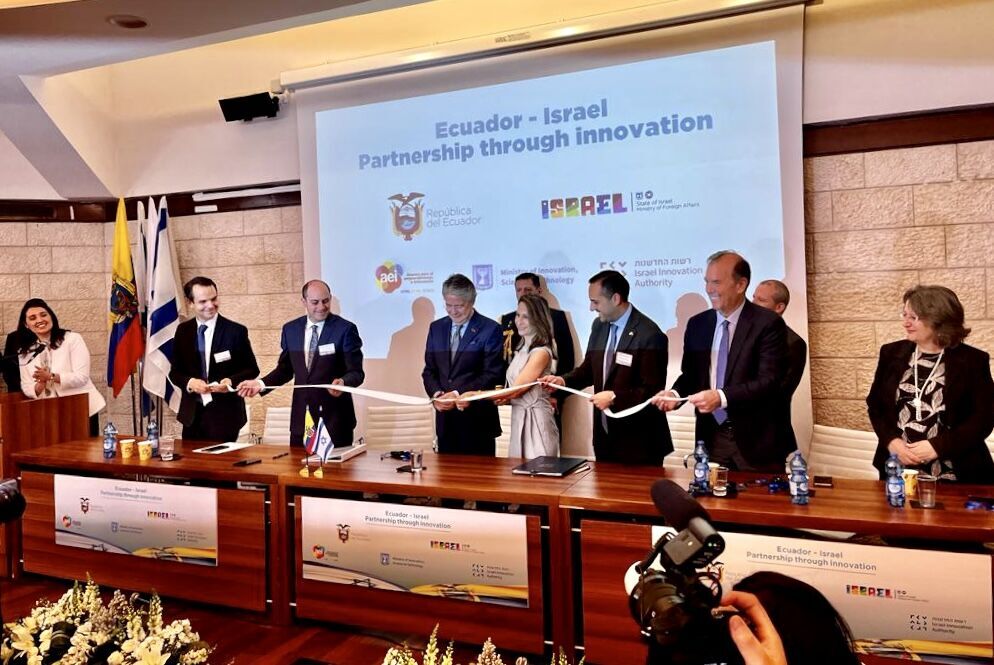
In order to understand Israel, you have to understand its culture; a short example can help illustrate what I mean. PayPal went to buy an Israeli anti-fraud company. In a meeting with the CEO of PayPal, the Israelis openly criticized the practices of the firm. PayPal leaders could not believe that the criticism was so direct and showed so little "respect" for the structure, size, and scope of the company. This assertiveness – this almost blatant confidence in defense of their ideas – Israelis call chutzpah (which is a Yiddish word used in Hebrew, meaning “shameless”). This Israeli value is instilled in children from a young age. It means that everything can be questioned, regardless of status, age, economic position, or hierarchy.
A second factor that makes so many Israelis into innovators is that asking questions and critiquing is part of their life. Most of them have been raised in the Jewish religion and throughout history, a central part of this religion has been rabbis constantly reinterpreting the meaning of their holiest book. This culture of arguing and debating about what is right and what is wrong – often in an open debate – has spread into the world of work, with employees and leaders questioning more, and more actively than in most other cultures. This motivates entrepreneurs to look for creative solutions to get ahead, especially when society or their companies face difficulties.
Finally, Israelis do not hold hierarchical structures or formalities in high esteem. For example, the Israeli army purposely employs very few officers in the higher ranks. They say this is to ensure that soldiers at lower levels take initiative and responsibility for their actions. In their army, 18-year-olds are given a lot of responsibility, which forces them to mature and allows them to develop people management and decision-making skills quickly. This is something that could be replicated in a variety of ways in other countries.
On my trip, I was able to see this with my own eyes. One evening, while I was leaving a bar with some friends from the immersion, we saw two groups of people fighting. As they jostled and argued, a group of special forces arrived. I'm not sure if they were police or military. Many of them were women and no older than 20. And yet even with their age and stature, they put the bullies against the wall and searched them very safely, without a second's hesitation. I was impressed by their level of confidence in a dangerous situation; I think it reflects the consequence of putting young people in difficult situations where they have to take on leadership roles very early.
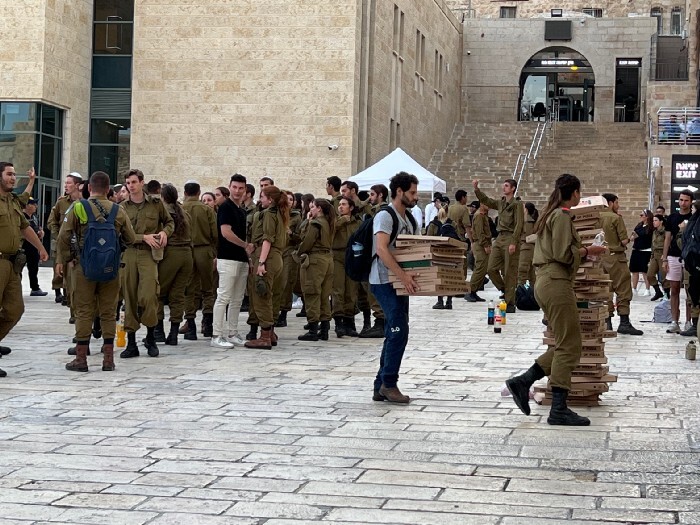
After leaving my bags at the hotel, I received a call inviting me to a restaurant nearby. I didn't know the people inviting me but knew they were from the leadership delegation that had arrived a few hours before me. I took a Gett (an Israeli taxi app) and arrived at the steakhouse excited to be there – in a new place, full of history and positive energy.
Chatting with the owner and the waitress, I immediately began to get a sense of how Israel works. The restaurant owner kept his cows on a kibbutz and had done genomic studies on them at the Hebrew University to improve the quality of their meat. As tasteful as a New York City steakhouse, his unassuming bistro was an expression of innovation. The meat was spectacular; in just 20 years, the quality of his product had surpassed the famed Peter Luger. I had the same impression of the wine; when they served me an Israeli vintage, I didn’t expect much – because Israel is not a country with a reputation for great wine. However, I was amazed at its quality and flavor.
Later, I returned to the hotel to meet up with two Ecuadorian businessmen. We’d met in the lobby and had decided to have breakfast together the following day with the rest of the leaders. It’s not every day you have the chance to talk to and share experiences with leading businessmen in unique settings outside of your normal social environment. Part of the joy of this experience was in exchanging ideas and listening to their advice. All the entrepreneurs told stories of their experiences with various innovators and leaders, both from Israel and from Ecuador. If I’ve learned anything in my years as an entrepreneur, it’s that most of my success has come from being in spaces like these – and talking. Lunches, dinners, and informal meetings are the best ways to exchange ideas and assuage doubts. Five minutes can change the course of a startup or company. One simple conversation.
On Sunday we took a tour of the city of Tel Aviv with Yacov, a local guide who spoke perfect Spanish. The entire coordinating team, as well as a diplomat who was part of the host group, spoke Spanish perfectly. That led me to an observation: migration to this country from various parts of the world has allowed them to have native speakers of many languages. Yacov, for example, had learned Spanish from his parents who were of Spanish origin; but Lisa, the host of the group of business leaders, was of Argentine origin; and Javier, the organizer of the program, is Mexican. This implied, for me, an approach that was not only culturally profound but also “native.” In Israel, such a concentration of native speakers can be replicated in several languages, due to the history of immigration that this country has had.
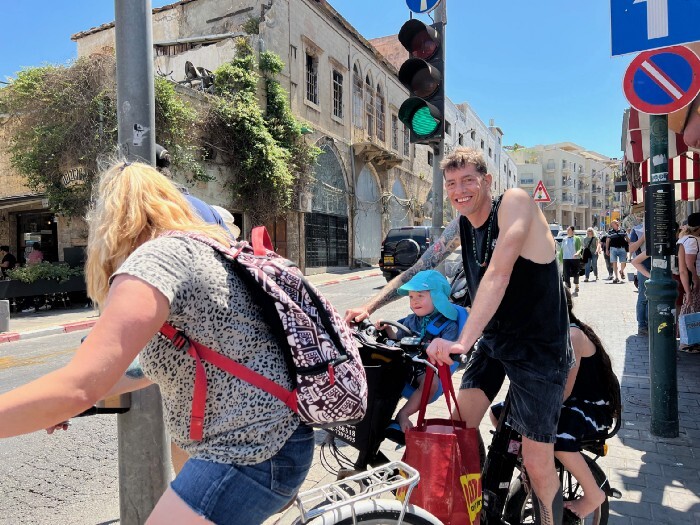
On Monday we were invited to the law offices of Pearl Cohen along with representatives of the Israeli Chamber of Commerce. We learned in a general way how Israel is connected to the world and learned a little about its legal structure, which is similar to that of the United States. This structure helps facilitate commerce and business in Israel; entrepreneurship is in the DNA of the country. Not everything is rosy, of course. The culture of direct communication, which always gets right to the point, can be shocking for other cultures, such as Latin America, for example. A fable from the book The Startup Nation illustrates how Israelis see themselves:
Four people were standing on a street corner…
an American, a Russian, a Chinese, and an Israeli…
A reporter walks up to them and says,
“Excuse me… What is your opinion on the meat shortage?”
The American says: What is scarcity?
The Russian says: What is meat?
The Chinese say: What is an opinion?
The Israeli says: What is “excuse me”?
In the afternoon, we had lunch at a restaurant called Claro. It was actually the best meal I ate in Tel Aviv. Israeli restaurants have a unique way of serving: they offer many sharing plates and then main courses for each diner. The variety of international flavors would compete with any restaurant in Madrid. I left that gastronomic hub happy.
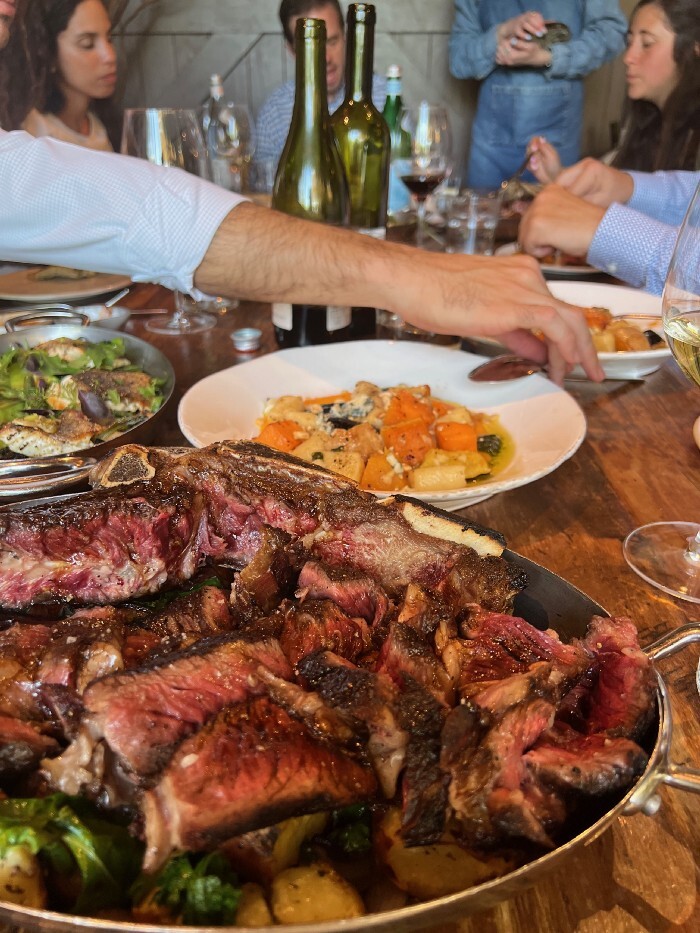
Later, we went to the Peres Center for Peace and Innovation to learn about Shimon Peres, one of the founders of the country. I have a unique history with the man, whom I met personally once in San Francisco. At that time, I had a Jewish-Mexican business partner and we had gone to present our startup at an event called Launch, which was set up for each product to “launch” itself all on the same day. Peres was there because he was going to visit Facebook, and he decided to stop by the conference. When he arrived at our booth, my partner said a few words to him in Hebrew, and Peres asked a couple of questions. Suddenly, the press recognized him and came to our booth. They took 35 thousand photos of us – and that's how we appeared in the San Francisco Chronicle alongside Shimon Peres.
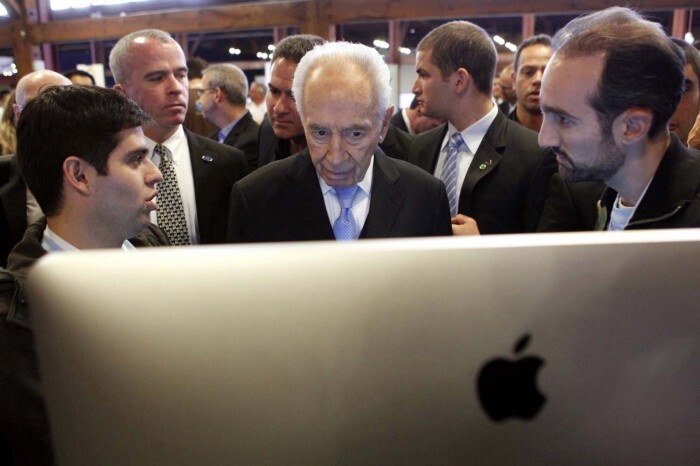
When I arrived at the center, I had mixed feelings, because that meeting with Peres marked a key turning point in my life. There are moments in life – and people that one meets in those moments – that determine who one will be in the following years. Looking out toward the sea from a downtown window that day in Tel Aviv, I noticed a sign that said: "Think Big." So I said: “Thank you.” I thanked Shimon Peres because due to that meeting I am now a different person, a better person, and a better businessman.
On Tuesday, we went to Mindspace where we saw several presentations and took part in a workshop on innovation called “Innovation Inside the Box.” I learned quite a bit. I remember, for example, the concept that to innovate, you don't have to get outside of your schema; the greatest innovation can be done from within.
During the session, we explored the example of Zara. Zara’s path to innovation began with a study of the customer's buying process. The game of innovation began, for them, with challenging the known order of the customer experience. First, they experimented to learn which variables were the most flexible. Then based on their findings, they made a surprising change: they put the cash register outside the dressing room. By doing this, their sales increased considerably. This simple innovation generated real results. It turned out that the time it took for customers to go from the dressing room to the cashier was leading to a lot of lost sales.
(Later, when I got back to my office, I met with each of my managers to go through each of our processes to see if we can innovate with this simple methodology. In my experience, these simple concepts, whose impact is almost immediate, produce the best results.)
That afternoon, we also visited the Weizmann Institute of Science, founded in 1934 by Chaim Weizmann, who was also president of Israel between 1949 and 1951. The institute offers postgraduate degrees in economics. All of its students receive scholarships, and so far 6 Nobel Prize winners and 3 Turing Prize winners have come from its halls.
The WIS collaborates with companies through in-depth studies that help create patents. Their scientific work has been an integral part of the creation of 7 of the best-selling remedies in the world. For students, there are no compulsory subjects; they study however they want, which includes access to a recently acquired quantum computer. (The Ecuadorian Academy has attempted to attract these scientists to Ecuador. The experience has been positive – because the Weizmann students are able to carry out research in Ecuador while receiving direct funding from the WIS.)
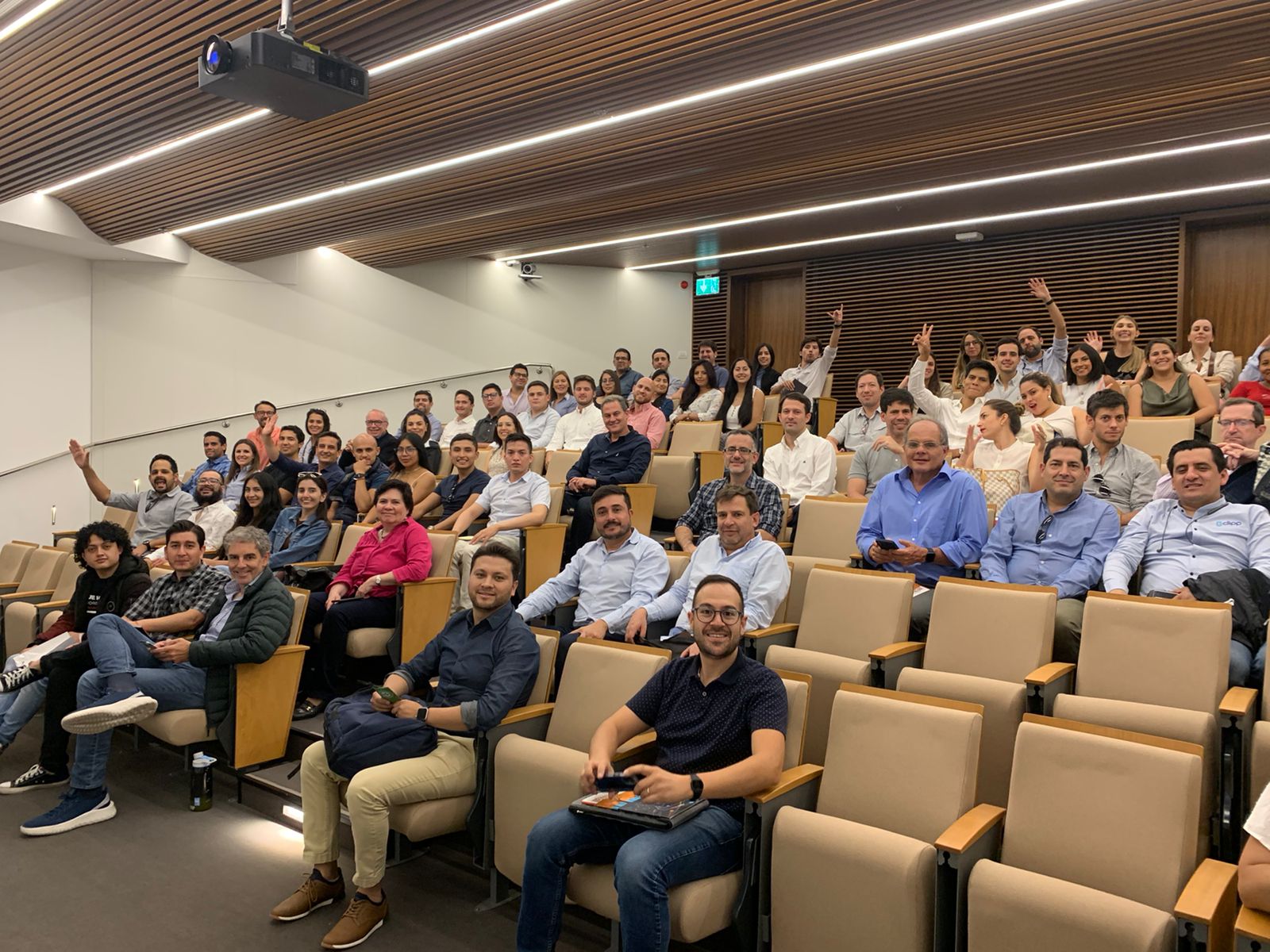
Later, we took a comfortable bus to Jerusalem – an enjoyable trip within a trip, filled with inspirational conversations. I had the opportunity to spend more time with great entrepreneurs and we were all able to share more stories. As I’ve said, you grow more when you share intimately with people. Small spaces make people more vulnerable and when vulnerable, people are more sincere. In such contexts, people connect – with ideas, with solutions, and with each other.
The architecture of Jerusalem made an immediate impact on me. It is a city built with limestone – a white stone that strikes an elegant and sober note. It isn’t for nothing that the saying goes: “You do not know a beautiful city until you know Jerusalem.” Immediately, the energy of this ancient city enveloped us. When we arrived at the King David hotel with its classic lobby adorned with the signatures of famous people, several Ecuadorian flags welcomed us. Many heads of state have stayed at this hotel; it was designed by Swiss architect Emil Vogt, constructed by Jerusalemite architect Benjamin Chaikin, and financed by a Jewish economic group from Cairo. The building has oriental-style domes, arches, various types of stone in different colors, and interior decorations with religious symbols and inscriptions.
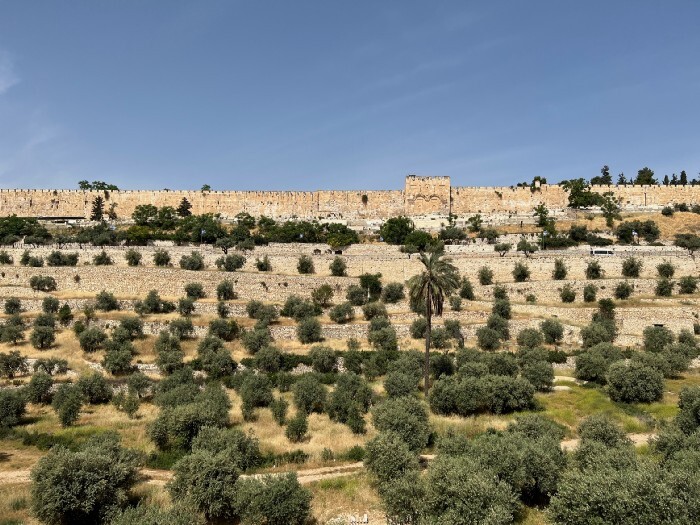
The next morning, it was time to visit the venture capitalists (or “VCs” for short). We had an appointment to meet two VCs; each was going to present us with their model and their value proposition.
The first one we visited was OurCrowd, a VC with 1.8 billion USD in funding that allows people to participate in their investments in small amounts, a “crowdfunding” style. When we arrived, we were greeted by two Israeli Latinos who spoke very good Spanish. They explained to us the benefits of working in Israel and explained their fund in a clear and direct way. What I got from this visit was direct access: I got to see how an ecosystem, both financial and entrepreneurial, is able to reach international markets. Although this fund is not very large in US terms, it is very difficult to talk to funds of any size in NYC or San Francisco. The fact that they opened their doors to us in this format says a lot about the quality of the program and the luck that we all had in taking part – especially the entrepreneurs. Getting to know the world of VCs is a huge honor and an advantage.
The second fund we visited was JVP (Jerusalem Venture Partners). We entered through a building that belongs to the Margalit Startup City, an innovation center that promotes the meeting of investors, businessmen, and entrepreneurs – focused mainly on Foodtech and Agritech. When we got there, we were told that the company on the left had been bought by Intel a couple of months ago. The feeling of entering an ecosystem that’s so alive can be compared to walking into a restaurant where everything is buzzing and the food is served on time, fresh and exquisite. The conversation was articulate and full of important questions about funding and the broader ecosystem.
Afterward, we visited the Hebrew University, Edmond J. Safra Campus, where we heard talks on the metaverse, creativity, sustainability, and other interesting topics. By then, we were tired and some members of our group were even beginning to show as much, with heavy eyelids and surreptitious yawns.
After a good dinner and a much-needed rest, we boarded the bus to return to the Hebrew University. There, Ecuadorian President Guillermo Lasso gave a conference for the Israeli authorities and Ecuadorian entrepreneurs. He gave us an extraordinary lesson in entrepreneurship. He said that knocking on doors, without fear of rejection, has been one of the keys to his success. From a very young age, he was calling, approaching, and being present in the lives of the people who could give him opportunities. For him, persistence in seeking to be heard is 80% of success. Speaking of Jerusalem, he told us: “Sometimes, the symbols that arouse emotion are more important than the ideas and actions we take.” Hence the importance of Jerusalem and its history to the Western world.
That afternoon, I went with a friend to see the center of Jerusalem, a place where the history of various peoples comes together. We visited the Wailing Wall and ended up at the Holy Sepulcher. At first, I wasn't sure it was the place since the symbols are different from those known to Catholics. Of course, my religious and cultural perspective is marked by Catholicism, and not by the other religions that were born from Christianity.
Upon entering, we asked and it was explained to us that the Church of the Holy Sepulcher is considered the most sacred place in Christendom and has been the most important center of Christian pilgrimage since the fourth century. It is where Jesus Christ was crucified (Calvary) and where the tomb of Jesus is said to have been; where he was buried and rose again. It is currently in the custody of various Christian communities, including the Catholic Church, the Armenian Apostolic Church, and the Orthodox Church. The door of the church is controlled by a Muslim family that has opened and closed it every day for 400 years.
The next day we took a tour of Jerusalem with my favorite guide, Yacob. When I told him that he was one of the best guides I’d ever met, he told me: “There’s no one like me.” I understood. His knowledge of religious history made me fall in love with my own religion and made me feel the pull to return to my roots. I’ve never been religious, but I do think I needed a reason to return to my past. In Jerusalem, I realized that we are all the same; we’ve lived a history full of conflicts and that faith has moved civilizations, but that in the end, we will all reach the same point. Jerusalem is definitely a city to visit.
On the last day, we toured the city of Bethlehem and the Dead Sea. Bethlehem is the city where Jesus of Nazareth was born. It’s also home to the oldest Christian temple in the world: the Basilica of the Nativity. It’s said to be built over the cave where Jesus' manger once was (called the Portal of Bethlehem) and is the only intact Byzantine church in Christian history, as well as the only temple that has survived the near-endless Middle Eastern wars over the last thousands of years.
The city is part of Palestine and lives on tourism, even though it is surrounded by walls that limit access to and from it from Israel. It is shocking to enter Bethlehem and see how different it is from Jerusalem. As soon as we entered, I was able to see the graffiti of the urban artist Banksy and a museum dedicated to him, which impacted me greatly. I’d heard a lot about him but had not seen his work in situ. Banksy is an English artist who makes satirical pieces on politics, pop culture, morality, and other themes. His art includes various techniques such as graffiti, stencils, and templates. One of his most controversial acts was when one of his works, Girl with Balloon, was shredded by a machine of his own invention at the end of an auction at Sotheby's in London.
We ended the day in the Dead Sea – floating, proving that the famous photo of a man reading the newspaper lying in the water is, indeed, possible.
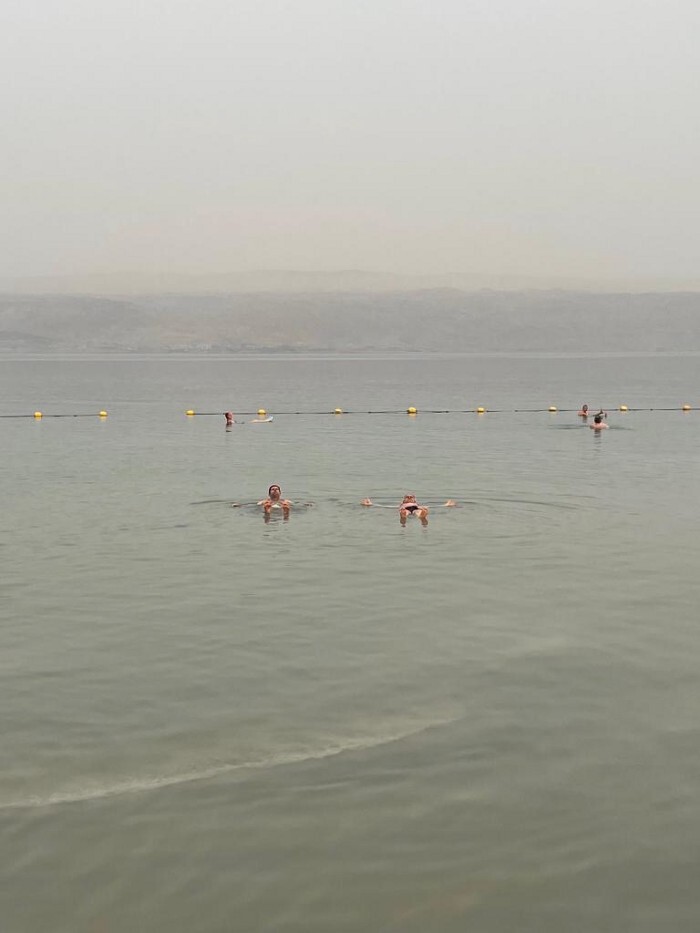
I came back home wanting to tell the story of my trip; to be able to share with new generations the importance of traveling, leveraging good connections, and returning home to apply what has been learned. It is useless to live extraordinary experiences if they are not transformational. Only by changing and trying new ways of doing can you transform your company, yourself, and your relationships.
--
If you want to stay up to date with all the new content we publish on our blog, share your email and hit the subscribe button.
Also, feel free to browse through the other sections of the blog where you can find many other amazing articles on: Programming, IT, Outsourcing, and even Management.

Andres was born in Quito, Ecuador, where he was raised with an appreciation for cultural exchange. After graduating from Universidad San Francisco de Quito, he worked for a number of companies in the US, before earning his MBA from Fordham University in New York City. While a student, he noticed there was a shortage of good programmers in the United States and an abundance of talented programmers in South America. So he bet everything on South American talent and founded Jobsity -- an innovative company that helps US companies hire and retain Latin American programmers.